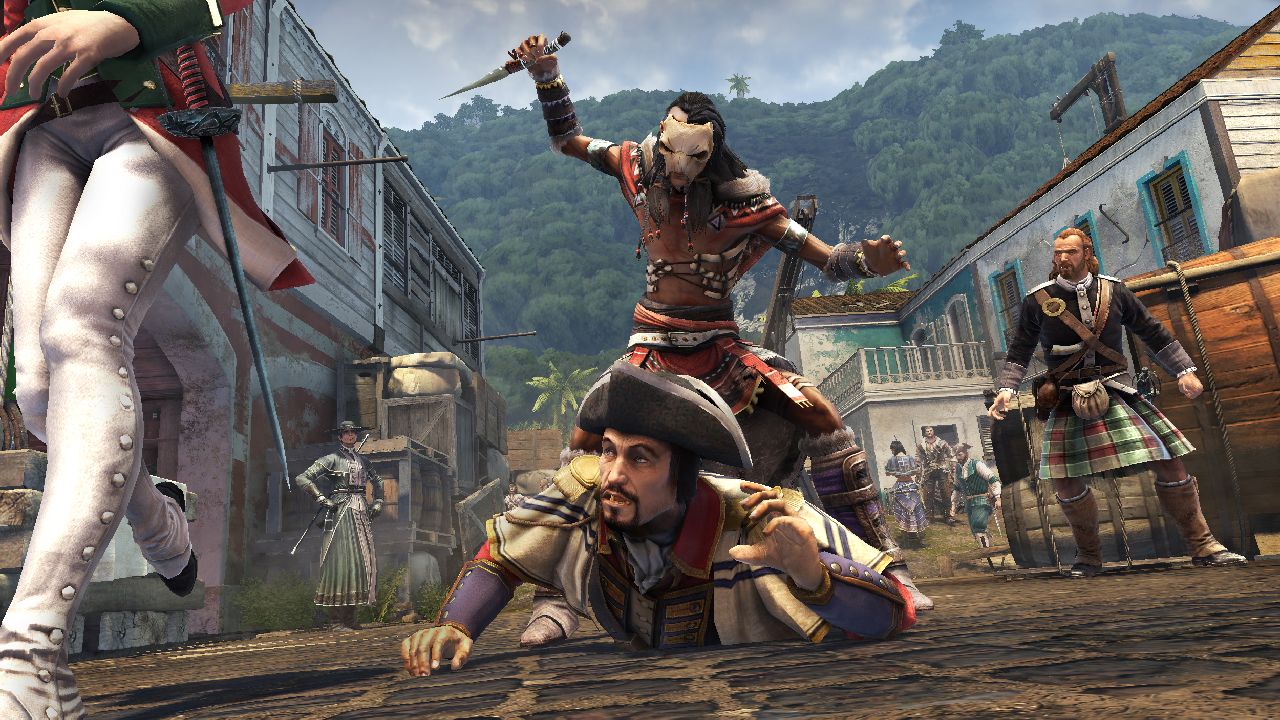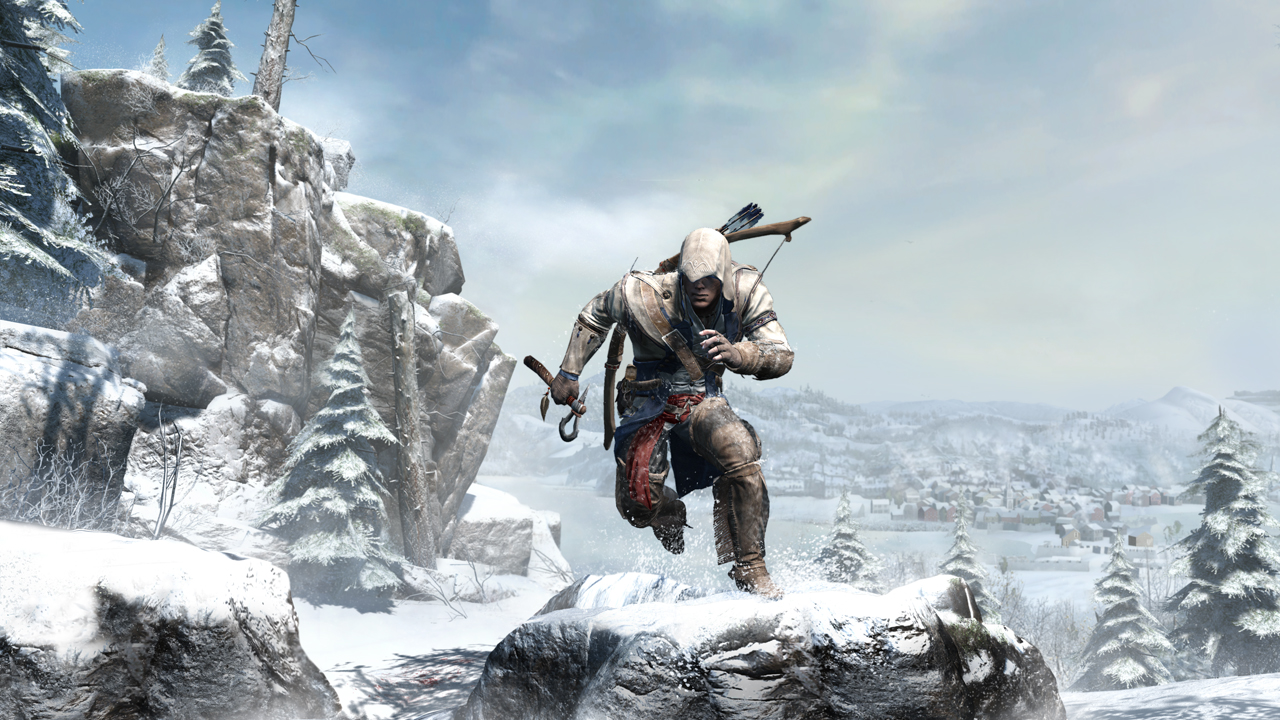Search
[{{{type}}}] {{{reason}}}
{{/data.error.root_cause}}{{{_source.title}}} {{#_source.showPrice}} {{{_source.displayPrice}}} {{/_source.showPrice}}
{{#_source.showLink}} {{/_source.showLink}} {{#_source.showDate}}{{{_source.displayDate}}}
{{/_source.showDate}}{{{_source.description}}}
{{#_source.additionalInfo}}{{#_source.additionalFields}} {{#title}} {{{label}}}: {{{title}}} {{/title}} {{/_source.additionalFields}}
{{/_source.additionalInfo}}Assassin's Creed III (Xbox 360)

Assassin's Creed III
Released: October 30, 2012
ESRB Rating: M for blood, intense violence, sexual themes, and language
Available On: PC, PS3, Xbox 360, Wii U
Genre: Stealth
Number of Players: Single-player, multiplayer
Price: $40
To many Americans there is a mystical quality to the years of the American Revolution: the men and women who participated in the founding of America shed blood and tears as their lives were torn asunder in the name of something greater than themselves. Their names have become as legend, their beliefs and positions hotly debated by different political factions as the years have progressed, and society changed with that progression.
Into this cauldron Ubisoft Montreal has leapt, and willingly, with its latest Assassin's Creed game, the fifth in as many years. In Assassin's Creed 3, they promised an evolution for the series, necessary since Assassin's Creed: Revelations launched to questionable quality and faltering mechanics. The series as a whole is built on a now-aging framework, and as of Revelations desperately needed an update.
To the point: Assassin's Creed 3 is not the game that provides that update.
There are some frankly brilliant sequences here, and the story takes risks that demonstrate Ubisoft's willingness to play with its characters and audiences. This is not new for the company, nor for this franchise. For a series born from the ashes of a Prince of Persia reboot, it is entirely unsurprising (see the Sands of Time trilogy and the 2008 reboot of Prince of Persia for more on this, but know that those games, for all of their faults, featured masterfully executed plot threads that resonate even today).

Strong Points: Gorgeous environments and representations of famous places and figures take the center stage here. The voice acting also deserves a nod: Assassin's Creed 3 features some of the best performances in a game in years, though the actor for Connor seems less than enthusiastic at times. Ship-to-ship combat is a welcome addition, and adds an extra element to pull players in. Some of the best sequences in the game take place on the water. The attention to detail is stunning, and actual knowledge of the history results in a greater understanding of the game.
Weak Points: Despite wonderful visuals, Assassin's Creed 3 stutters, has graphical hiccups that affect gameplay, and has some of the worst anti-aliasing problems this side of the Playstation 2. A large number of glitches threaten to render the game unplayable, most of which should have been fixed by a rather large patch at this point. Some of the historical events here feel contrived, with the Paul Revere sequence ending up perhaps the most grievous offender. The "Desmond story", out of the Animus, is by now largely laughable, and has plenty of grimace-worthy moments because the writing is so unfortunately terrible. The good news is, it doesn't last forever; the bad news is, the ending is disrespectful to its audience, and ends up being worse than the Mass Effect 3 ending. No, seriously.
Moral Warnings: Plenty of violence, gore, and gory, violent executions. Combat fills this game, and ends up being a core focus here. There's an explicit murder shown, sequences involving the gallows, use of axes and swords and tomahawks, and the ability to hang enemies. Also shown is at least one dismembered leg as the result of a heavy artillery shelling, and plenty of sequences depicting war. There's occasional profanity (generally, s*** and f*** are the words of the day), blaspheming, and sexual dialogue, though no sexual content actually makes it into the game.
For most of the game, players don the now-trademark Assassin gear as Connor (real name, Ratonhnhaké:ton), a half-British member of the Iroquois Confederation, specifically a tribe of Mohawk. That's part of where Ubisoft takes risks here. The other part is that you don't even play as Connor, let alone meet him, until a good six hours in.
To that end, Assassin's Creed 3 delivers more of the same gameplay throughout. However, because of the setting, things feel different: instead of darting across rooftops (as in previous games), players find themselves taking to the streets. This was never one of the highlights of the series, and serves to illustrate some of the main problems with the franchise as a whole.
The first Assassin's Creed game, released in 2007, used crowds as a form of stealth: the idea was that an assassin could blend into the crowd, kill his mark, and disappear into a group of strangers. I can remember only one or two sequences where this was functionally relevant, and those came from the still-brilliant Assassin's Creed 2. The following games lessened crowds and provided more open terrain to move across, which has always been a point of tedium in this series. The third numbered entry in the series has an expansive map, with towering trees to climb, animals to hunt, and sizeable cities to explore, but the game never feels as revelatory as Assassin's Creed 2, the zenith of the series as a whole, and that is ultimately its undoing.
This isn't for lack of trying. There are some incredibly impressive things at work here, not the least of which is the world in which the game takes place. As Connor, taking part in major moments in history seems designed to captivate the player, and for the most part, this is successful. Whether leading troops at the Battle of Concord, charging across a smoke-clogged battlefield during the Siege of Charleston, or taking part in the Boston Massacre, most of the moments here feel completely natural: you aren't necessarily a centerpiece, or even vital, but Connor feels integrated into the history. But then a moment comes along with Connor leading Paul Revere on his ride, or taking control at the Boston Tea Party, and everything feels somehow off. This isn't a story about the Crusades, something more or less unknown to everyone outside of the most astute of history lovers, nor is it a story about the Renaissance, which seems so far removed. Instead, taking part in something more recent, even if it was over two hundred years ago, even if it is consistently misinterpreted and mythologized by both major sides of America's current sociopolitical divide, ends up feeling pedantic and forced, and destroys any suspension of disbelief that the story attempts to provide.
This is heightened by the lack of characterization in Connor, especially compared to Ezio, the protagonist from Assassin's Creed 2 and its sequels. Ezio was empathetic, strong, stoic; Connor is rash, ambitious, and quick to anger. It tends to feel like the designers took their time with Ezio, knowing that they had two more installments to tell his story, and rushed Connor's development, which is out of step with the tone established at the beginning of the game.
The unevenness exemplified by the story and characterizations persists through the rest of the game, as well. Game-breaking bugs apparently existed alongside Jefferson, Adams, and Washington, and their existence was a blight upon the otherwise fascinating history of the Revolution. The sprawl of New England, as presented by Assassin's Creed 3, circa the late-1700s, is a gorgeous mess, at once impossible to ignore even as the rough edges show themselves so miserably. One chase sequence in particular, towards the end of the game, took me almost two hours to get through. This wasn't because of difficulty. One moment, an unpredictable blast would send Connor careening to the side. Mission failed. The next, a false ledge on an otherwise climbable box would stop all progress, as Connor attempted to jump through the box and landed, yes, on the box on which he was still standing.

Higher is better
(10/10 is perfect)
Game Score - 72%
Gameplay - 15/20
Graphics - 7/10
Sound - 10/10
Stability - 1/5
Controls - 3/5
Morality Score - 44%
Violence - 2/10
Language - 0/10
Sexual Content - 5/10
Occult/Supernatural - 8/10
Cultural/Moral/Ethical - 7/10
For a major title from a major studio, in 2012, this is a problem. This is the end of the lifecycle of the current console generation. PC games are reaching heretofore-unseen heights. I have seen indie games with more stability than this game has. Ubisoft is a big publisher; like Bethesda, they need to start acting like it. Yes, Assassin's Creed 3 is a large game, and yes, large games have their fair share of problems, but Assassin's Creed 3 is rife with them.
Removed from gripes of story and brokenness, combat is still wonderfully frustrating, a bloody dance when things move correctly. As in prior series entries, rhythm is more important than precision; wisely recognizing this, the developers simplified the controls and the contextual prompts as previously displayed. This is where Assassin's Creed 3 flows, where it works beautifully. It isn't what sticks with me about the game, but it's what I remember as really working. Here is the most perfect rendition of the series' much-maligned combat system. It is perhaps more violent and gory than previously, which is as questionable a decision as any made here. Certain sequences made my stomach churn, just because of how grisly they seemed.
Assassin's Creed 3 is predictably gorgeous, and the sound design is lovely. Former series composer Jesper Kyd, however, is missed; nothing equaling the score from the first three games is present here, and to be sure, no one necessarily expected that to be the case given Kyd's limited involvement in Assassin's Creed: Revelations. Voice acting, on the other hand, is a noted high mark, with only the writing as opposed to the delivery giving pause. This isn't saying much after the consistently strong writing present in the Assassin's Creed 2 games, but there's a problem when you can pinpoint a character's grating presence as more a result of the script than anything else.

And what of the world, packed with things to do before and after the main story is complete? The amount of content on display here rivals Rockstars' Grand Theft Auto games, or Volition's Saints Row series, simply in diversity, even if most of it isn't uniformly excellent. The naval combat is a highlight: I found myself running through all the sailing missions, just to experience them. Somehow, through some strange meeting of the minds, Ubisoft Montreal managed to create a game that evokes equal parts Master & Commander and Pirates of the Caribbean. Dodging cannon fire over a surging sea is enthralling, as are raiding cliffside fortifications and hunting rogue vessels through a mist-covered, rock-filled shallows.
As mentioned above, there is a lot of bloody combat in Assassin's Creed 3, including sequences of war (at least one of which features a dismemberment), and naval combat. This has come to be the most dominant feature of the Assassin's Creed series, as the violence has grown more brutal, and more excessive, as time has gone on. Elements of Native spiritualism come into play in certain areas of the game, but these tend to be nothing more than a framing device for the series' established, crazy interpretation of religion and belief. Profanity comes into play, both in French and in English, but isn't especially prevalent during the proceedings. In addition, there's some sexual dialogue sprinkled throughout, though if you're not paying attention, it likely won't be noticeable.
Ultimately, for all of the good that Assassin's Creed 3 has in it, for all of the work that went into its world, it is never the game it had the potential to be. There are moments that stand out: a bloodied fight in the rain; stunning assassination set pieces, requiring not so much gameplay but attention; cannonfire raining down on Charleston as buildings crumble; stumbling through a smoke-clogged battleground, attempting to flank the frontlines. Those moments never translate into the defining game that Assassin's Creed 3 could have been.
Linear games have been done right before, and one only need look to Naughty Dog's recent Uncharted 3: Drake's Deception to see that in action. Assassin's Creed 3 is an open-world game that desperately wants to be linear, and a linear game aching to expand beyond the strict constraints its development team and its game engine have imposed upon it. Sadly, none of this is to be. What's left is Assassin's Creed 3, an underwhelming game grasping for something much better, something that never materializes. This is far from the worst game of the year, and it deserves time and attention, for it has things to say and it does so with some style. But it is also a game to learn from, a game which ably demonstrates exactly what can go wrong when a development team reaches too high, or stretches too far, and isn't given the time to fulfill their vision.






